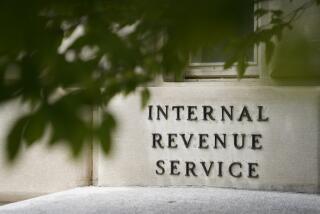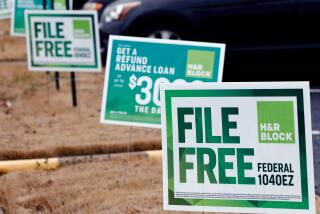YOUR TAXES: A SPECIAL REPORT : TAX PREPARERS : Consumers Should Choose Their Adviser as Carefully as They Do a Doctor
- Share via
For some people, the worst part of preparing taxes this year will be finding a preparer.
Tax preparers undoubtedly will be busier and harder pressed to find time for everyone wanting their help. Confused and intimidated by the new tax law, taxpayers are increasingly opting to hire someone to do their returns instead of doing the work themselves.
“The best way to find an accountant now is to call five of them. If one calls you back, ask him or her why they aren’t busy,” said William F. Easley, president of the California Society of Certified Public Accountants in Redwood City.
About half of the 100 million people who filed tax returns last year used preparers, with many more expected to do it this year.
For many people, the effort to find a competent, trustworthy preparer, along with the anxiety it causes, is much like what goes into finding a good doctor or lawyer. Professionals advise people to talk to friends, relatives, co-workers and business associates about who they use in much the same way they might go about selecting a doctor.
Before choosing a preparer, however, taxpayers should first ask themselves two basic questions: Do I really need a preparer? And how much do I want to pay?
Tax professionals say that not all laymen need to be frightened by the new tax law, especially because filing actually will be easier for some people.
“There is a fairly big group of taxpayers who did get simplification out of the Tax Reform Act. Anyone should be willing to spend two to three hours to see how far along they can get,” said Donald H. Skadden, vice president of taxation with the American Institute of Certified Public Accountants in New York.
Skadden said taxpayers who make $40,000 or less, have no outside income, don’t own a home and have few deductions may even be better off taking the standard deduction, which can be done easily without hiring a preparer.
Do-it-yourself tax preparation books or computer software designed to prepare taxes might be much cheaper than getting outside help. Depending on how complicated the return, tax preparers typically charge from $50 to $500 for a return.
Donald Procida, administrator with the state Department of Consumer Affairs Tax Preparer Program, advises taxpayers to get an estimate first from preparers.
“If they won’t give an estimate, walk out,” he said.
Many preparers charge by the hour, he said, so taxpayers should do as much as they can to gather necessary receipts and documents in advance to cut down on billing time.
Procida also suggests that taxpayers should know whether a preparer will accompany them without imposing an extra charge if they are summoned to appear before the Internal Revenue Service or State Franchise Tax Board. He adds that it should also be clear who will pay for errors the preparer makes.
Taxpayers also have to decide how much expertise they need before selecting a preparer.
At the least skilled end of the spectrum are tax preparers who lack the authority to do much else except fill out forms. These preparers are required to register with the state Consumer Affairs Department, display a certificate from the state and post a $2,000 bond.
Next on the scale are enrolled agents, who can represent people before the IRS. They must either pass a test by the agency or work at least five years as an IRS auditor.
Certified public accounts must pass a state exam and are licensed by the State Board of Accountancy. Tax lawyers must pass the state bar exam.
Procida says that the most common complaints his agency gets are procrastination by preparers, collecting fees without performing services and complaints that preparers won’t go with taxpayers before tax authorities without charging extra fees.
State and federal authorities claim that they are cracking down on abuses by tax preparers this year.
Last month, Harold Taylor, who owned a tax preparation business in Inglewood, was sentenced to 16 months in state prison and fined $10,000 for filing false tax returns for clients.
State tax authorities said Taylor had clients sign legitimate forms, but that he would then submit revised ones to the state--without the clients’ knowledge--that listed more dependents, expenses and deductions to increase the refunds. He then skimmed more than $7,000 from the refunds, authorities said.
The IRS suggests that to avoid abuses, taxpayers should use firms that are in business year-round. Taxpayers also are advised to check closely how the preparer has documented claims, check the preparer’s work on the form before signing it and demand a copy of the return after it is completed.
Ultimately, IRS and state officials note, taxpayers are responsible for the claims made on their returns and they can be subject to penalties and interest charges for inaccuracies.
More to Read
Inside the business of entertainment
The Wide Shot brings you news, analysis and insights on everything from streaming wars to production — and what it all means for the future.
You may occasionally receive promotional content from the Los Angeles Times.










